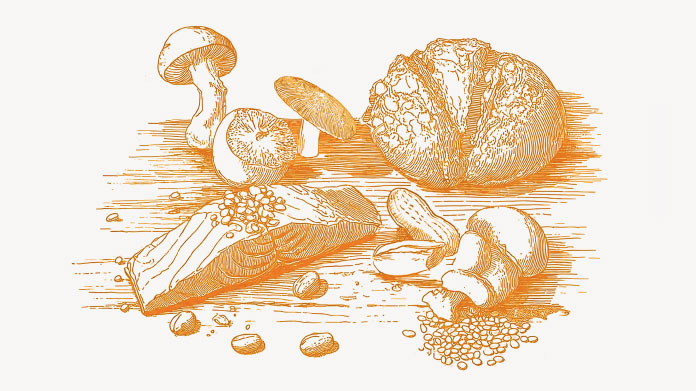What’s the best way to take vitamin B12?
How does the body absorb vitamin B12? Which supplement should you choose? Is there an ideal time of day to take it? Supersmart provides the answers.

For maximum absorption, vitamin B12 should be taken in spaced out doses during the day as the body can only absorb small amounts of B12 at a time. It’s also best to avoid taking it too close to a vitamin B12-rich meal: one, for example, containing offal or red meat in general, shellfish, oily fish (tuna, herring mackerel, trout) or eggs...
With regard to dietary supplements, the three forms of vitamin B12 (cyanocobalamin, methylcobalamin et hydroxycobalamin) are all absorbed by the body in a similar way.
Why does vitamin B12 need to be taken in several doses?
The body absorbs vitamin B12 via two mechanisms (1):
- Passive diffusion, which takes place in the mouth and gut: this is a minor system and is insufficient to deliver an optimal intake of B12;
- Diffusion that depends on an « intrinsic factor ». This is a glycoprotein released in the stomach when gastric acidity results in the cleaving of cobalamin from the proteins to which it is attached. This system of diffusion is more effective but saturable: once the ‘quota’ of absorbable vitamin B12 is reached, it will take around four to six hours before it can again be absorbed.
That’s why it’s advisable to take supplements in several doses, and to avoid taking them at the same time as a vitamin B12-rich meal.
The role of vitamin B12 and potential consequences of deficiency
A deficit in vitamin B12 can pose serious health risks (2), such as:
- anaemia (lack of red blood cells);
- nerve problems which can prove irreversible if the B12 deficiency is not quickly addressed: ataxia, a disorder that affects coordination, is one of the symptoms of cobalamin deficiency;
- incontinence;
- problems with vision.
Certain individuals need to be particularly careful when it comes to vitamin B12 intake:
- older people in whom absorption is less effective;
- those following a strict vegetarian or vegan diet, since cobalamin is primarily found in foods of animal origin.
Several studies have demonstrated the efficacy of vitamin B12 supplementation (up to 2mg a day) in preventing deficiency. We recommend Methylcobalamine 1 mg, a supplement that comes in the form of sugar-free, sub-lingual tablets, and helps to optimise function of the nervous system and reduce fatigue.
References
- O'Leary F, Samman S : Vitamin B12 in health and disease. Nutrients. 2010, Vol. 2(3), pp 299-316.
- Pierre Rufenacht, Anne Iten, Sara Mach-Pascual : Hypovitaminose B12 : challenge diagnostique et thérapeutique. Rev Med Suisse. 2008, Vol. 4, pp 2212-2217.
- Kuzminski, A. M., Del Giacco, E. J., Allen, R. H., Stabler, S. P., and Lindenbaum, J. Effective treatment of cobalamin deficiency with oral cobalamin. Blood 8-15-1998;92(4):1191-1198.
4 Days
Good quality product and customer service.
So far, I'm liking this product, and the customer service was very good.
ELZL
11 Days
The products I use are excel·lent
The products I use are excel·lent
ROSAS Josep Maria
19 Days
Delivery is prompt and I never saw a…
Delivery is prompt and I never saw a quality problem with the manufacturing. It is not possible to assess efficacy on a personal basis, since too many factors come into play. Efficacy can only be assessed statistically with a sufficient number of cases.
Roger De Backer
20 Days
I collaborates with the Supersmart…
I collaborates with the Supersmart more than 10 years. Every thing is going good. Quality of the things is good. Delivery comes in time. Five stars definitely !!!
Oleksiy
20 Days
All good
Simple, frictionless site, easy ordering, good delivery updates and execution.
Chris Robbins
22 Days
I feel better
I feel better
Peter Ammann
22 Days
Prompt delivery
Prompt delivery
JAKUB Radisch
23 Days
My new go-to for top quality supplements!
I am buying more and more of my supplements from this superb, high quality company. Cannot recommend it enough. Plus, excellent customer service with a quick, helpful team and speedy deliveries. Highly recommend Supersmart!
Cecilie H.
27 Days
SUPERSMART WHAT ELSE👍
SUPERSMART WHAT ELSE👍
DIEDERLE Christophe
30 Days
Excellent quality products with…
Excellent quality products with innovative formulas, as someone who has been suffering with acid reflux, these supplements have been lifesavers.
Oriana Moniz
30 Days
high quality supplement!
high quality supplement!
GALANT
30 Days
Good service prompt delivery
Good service prompt delivery
Mrs Marcella Reeves
35 Days
I like your clear explanation
I like your clear explanation. And how to make a choice of products for a specific health problem
Ingrid
42 Days
Great product and it arrives quickly.
Great product and it arrives quickly.
SOMMARIVA Gianni
43 Days
Excellent products and fast service.
Excellent products and fast service. What do we need more?
Margarida



